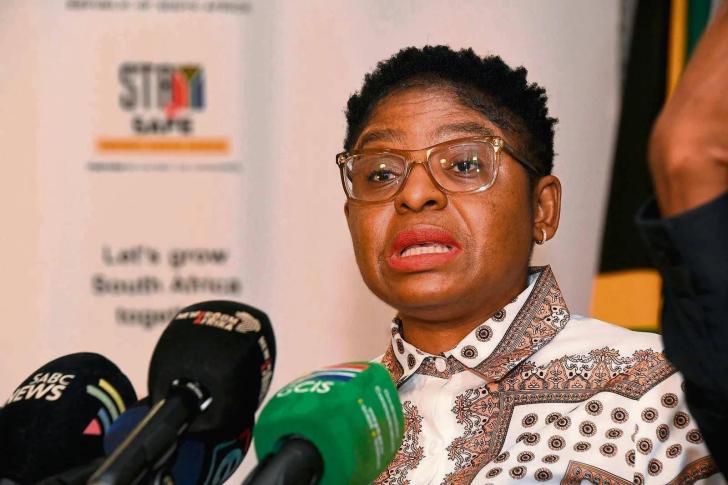News / National
Ntshavheni's 'concomitant action' moment to kill zama zamas
14 Nov 2024 at 18:16hrs |
0 Views

In a controversial statement on Wednesday, Minister in the Presidency Khumbudzo Ntshavheni said the government intends to "smoke out" as many as 4,000 illegal miners reportedly trapped underground near the North West town of Stilfontein. She emphasized that authorities would not risk the lives of law enforcement to aid what she termed as "criminals," adding that the trapped miners "are not to be helped" but rather "persecuted."
"Criminals are not to be helped. Criminals are to be persecuted. We didn't send them there, and they didn't go down there for the good benefit and good intentions of the Republic," Ntshavheni stated, her remarks swiftly sparking a social media backlash. On X (formerly Twitter), users condemned her words as "inhumane" and "distasteful," with calls for the government to demonstrate greater humanity towards the trapped miners.
Ntshavheni's comments have drawn parallels to a previous mining tragedy associated with South African President Cyril Ramaphosa. In 2012, Ramaphosa, then a board member of Lonmin, faced scrutiny for his communication with company officials prior to the Marikana Massacre, which saw police open fire on protesting miners, killing 34. Ramaphosa's emails on August 15, 2012, called for "concomitant action" to address what he described as "dastardly criminals," a characterization widely viewed as exacerbating tensions and prompting the violent crackdown the following day.
These recent remarks by Ntshavheni have rekindled longstanding concerns over the treatment of miners and the South African government's stance on labor disputes in the mining sector. Critics argue that the language used by officials, both then and now, shows a troubling pattern of demonizing workers as criminals, leading to harsher responses rather than attempts at de-escalation.
Ntshavheni's firm stance arrives amid escalating tensions in the mining industry, where illegal mining remains a growing issue. South Africa has struggled to curb illegal mining activity, with underground operations by informal miners, or "zama zamas," often resulting in dangerous conditions and environmental degradation.
Meanwhile, critics also argue that Chief Justice Raymond Zondo's tenure has coincided with actions some perceive as eroding principles of fairness and human rights in South Africa. This perspective links recent incidents to the legacy of apartheid-era policies and enforcement, with some noting the jailing of former President Jacob Zuma as a symbolic shift in the country's judicial approach.
As the government prepares its response to the trapped miners in Stilfontein, Ntshavheni's statements have left many South Africans questioning the balance between law enforcement and human rights in dealing with the complex issue of illegal mining.
"Criminals are not to be helped. Criminals are to be persecuted. We didn't send them there, and they didn't go down there for the good benefit and good intentions of the Republic," Ntshavheni stated, her remarks swiftly sparking a social media backlash. On X (formerly Twitter), users condemned her words as "inhumane" and "distasteful," with calls for the government to demonstrate greater humanity towards the trapped miners.
Ntshavheni's comments have drawn parallels to a previous mining tragedy associated with South African President Cyril Ramaphosa. In 2012, Ramaphosa, then a board member of Lonmin, faced scrutiny for his communication with company officials prior to the Marikana Massacre, which saw police open fire on protesting miners, killing 34. Ramaphosa's emails on August 15, 2012, called for "concomitant action" to address what he described as "dastardly criminals," a characterization widely viewed as exacerbating tensions and prompting the violent crackdown the following day.
Ntshavheni's firm stance arrives amid escalating tensions in the mining industry, where illegal mining remains a growing issue. South Africa has struggled to curb illegal mining activity, with underground operations by informal miners, or "zama zamas," often resulting in dangerous conditions and environmental degradation.
Meanwhile, critics also argue that Chief Justice Raymond Zondo's tenure has coincided with actions some perceive as eroding principles of fairness and human rights in South Africa. This perspective links recent incidents to the legacy of apartheid-era policies and enforcement, with some noting the jailing of former President Jacob Zuma as a symbolic shift in the country's judicial approach.
As the government prepares its response to the trapped miners in Stilfontein, Ntshavheni's statements have left many South Africans questioning the balance between law enforcement and human rights in dealing with the complex issue of illegal mining.
Source - online
Join the discussion
Loading comments…









































